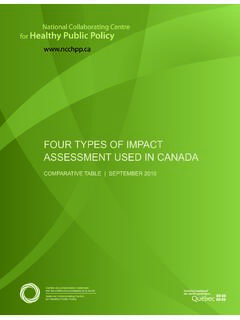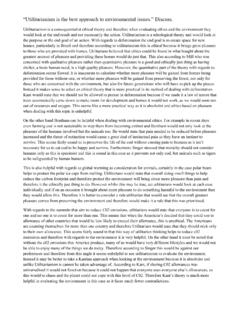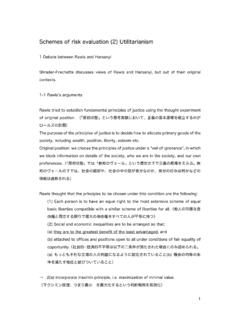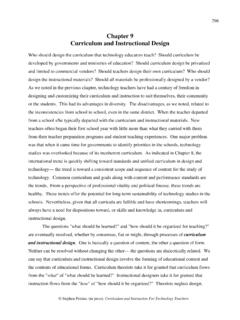Transcription of Utilitarianism in public health - NCCHPP
1 Briefing NoteFor up-to-date knowledge relating to healthy public policyUtilitarianism in public health January 2016 How can we perceive and address ethical challenges in public health practice and policy? One way is by using ethical concepts to shed light on everyday practice. One does not have to be a specialist in ethics to do so. This document is part of a series of papers intended to introduce practitioners to some concepts, values, principles, theories and approaches that are important to public health ethics. Introduction Many authors argue that public health interventions and programs are rooted in utilitarian ethics (Holland, 2007; Horner, 2000; Nixon & Forman, 2008; Rothstein, 2004; Royo-Bordonada & Rom n-Maestre, 2015).
2 For example, Royo-Bordonada and Rom n-Maestre write that public health is in essence [..] utilitarian because it seeks to preserve the health status (something that contributes to the well-being of persons) of the maximum number of individuals possible, ideally the entire population (2015, p. 3). Roberts and Reich (2002) also assert that the utilitarian perspective seems particularly intuitive to those working in public health . According to these authors, utilitarian ethics would therefore seem to be well suited as a theory for evaluating and justifying the morality of public health interventions and programs and, by extension, for determining what we should and should not do in the area of public health .
3 But what is Utilitarianism ? What are its main strengths? What are the main ways in which it has been critiqued? And what role should Utilitarianism play in public health ? In this short document, we will try to respond briefly to these four questions, showing, in particular, that the presumed link between public health practice and utilitarian ethics is not as evident as it may seem at first glance. Since Utilitarianism is a normative ethical theory, we will begin by discussing what that means. What is a normative ethical theory? A normative ethical theory (also referred to as a moral theory) is a systematic conception of what, morally, we should and should not do, both individually and collectively.
4 Such a theory can guide decision making and justify or evaluate the morality of actions, interventions and public policies (Dawson, 2010, p. 193). Several normative ethical theories exist, including Utilitarianism , Kantianism and deontological theories, rights-based theories and virtue ethics. Normative ethical theories generally incorporate two essential components: a theory of the good and a theory of the right (Rawls, 1971). The theory of the good (also called value theory or axiology) defines the good, , that which has moral value (Pettit, 1993).
5 Autonomy, friendship, self-respect, solidarity, health , well-being or pleasure, for example, may have moral value. The theory of the right determines what is the right thing to do, with respect for the good, for individual and institutional agents (Pettit, 1993). They might have to respect or promote solidarity, for example. What is Utilitarianism ? Utilitarianism is a normative ethical theory that identifies the good with utility and the right with that which maximizes utility. Thus, according to Utilitarianism , utility is the value that should guide actions, programs and policies.
6 Our moral obligation, the right thing to do, is to maximize utility. THE GOOD IS UTILITY For Utilitarianism , the good, or that which has value, is utility and only utility. But what is utility? Since the first systematic formulations of Utilitarianism in the 19th century, many definitions of utility have been proposed, giving rise to different versions of Utilitarianism . We will briefly present the four main conceptions of utility. You may notice that in these four conceptions there is Tel: 514 864-1600 ext. 3615 Email: Twitter: @ NCCHPP Briefing Note Utilitarianism in public health an evolution from the immediate and pleasure-pain related to the longer-term, rational and planning for overall interests or well-being related.
7 Utility is pleasure and the absence of suffering In its earliest formulations, utility (or the good) was associated with pleasure and the absence of suffering, and evil (or the bad) was associated with suffering and the privation of pleasure (Bentham, 1961 [1789]; Mill, 1998 [1861]; Sidgwick, 1907 [1874]). Utility is the satisfaction of preferences Some authors view utility instead in terms of the satisfaction of individual preferences (Hare, 1981; Harsanyi, 1977; Singer, 1993). This is probably the most influential approach today (Goodin,1993) and the one underpinning cost- benefit economic analyses that make particular use of the willingness-to -pay method to identify the preferences of individuals (Roberts & Reich, 2002).
8 1 Utility is the satisfaction of informed or rational preferences Utility has also been defined in terms of the preferences that individuals would have if they had all the information and cognitive abilities needed to make informed choices (Brandt, 1979). Such a conception of utility thus moves away from preferences that individuals have, for example, when they are under the influence of alcohol or drugs, or when they are about to make a choice and do not have all the relevant information. Utility is the satisfaction of interests Moving still further away from preferences expressed by individuals, some utilitarian theories define utility as the satisfaction of certain basic interests shared by all, such as being healthy or having a dwelling.
9 These interests concern resources that will be necessary for people to have before pursuing any of the more particular preferences that they might happen to have (Goodin, 1993, p. 244). 1 For a more detailed explanation of the links between Utilitarianism and various methods of economic evaluation, as well as a discussion and a critique of the main ethical THE RIGHT IS THAT WHICH MAXIMIZES THE GOOD The other essential component of a normative ethical theory is a theory of the right which determines what people and institutional agents must do with respect to the good.
10 Utilitarian theories are consequentialist in that they determine the moral value of actions, policies or institutional arrangements with reference solely to their consequences (Honderich, 1995) and not, for example, with reference to certain inherent characteristics of actions or to the intentions of moral agents. In other words, for consequentialists, and thus for utilitarians, no action is either right or wrong (good or bad) in itself. Instead actions are conceived of as instruments that may be more or less useful, more or less effective and efficient, for doing good.

















